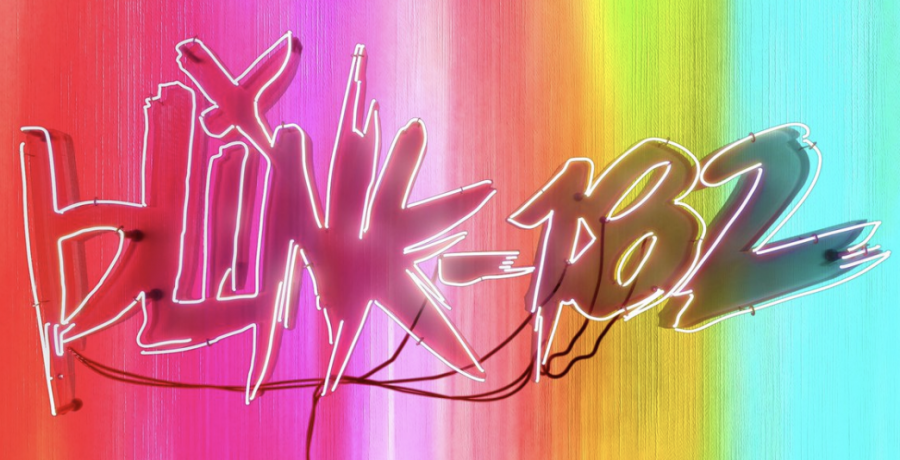blink-182 returns with “NINE”
November 11, 2019
blink-182’s “NINE” is a noteworthy album that offers a unique perspective on anxiety and depression.
Released on Sept. 20, it is the second album released without founding member Tom Delonge after his departure from the band in 2015, which made bassist Mark Hoppus the only remaining original member, as original drummer Scott Raynor left in 1997. After Delonge’s departure, Matt Skiba of the band Alkaline Trio took over his duties on singing, songwriting, and playing the guitar. “NINE” is their eighth top ten album on the Billboard 200. Previously, they had achieved two number one albums, 2001’s “Take Off Your Pants and Jacket” and 2016’s “California.”
Their most famous albums, all released from 1999-2003, used the same producer, Jerry Finn. Considered a legendary producer by many in the pop-punk community, it is arguable that he is the one who mostly created blink-182’s classic sound. However, after his sudden death in 2008 at age 39, the band has been scrambling, unable to find another producer that worked as well with their sound as Finn did.
Their first album released after their hiatus, “Neighborhoods,” was produced solely by the band in their own separate studios in separate cities. While it worked in that instance, it sounds more like a puzzle with missing pieces than a smooth mural. Their previous album, “California,” was released in 2016 and was solely produced by John Feldmann (formerly of the ska band Goldfinger), who received songwriting credits on many songs on that album and also produces many modern pop-punk bands. It seemed like he deliberately tried to make “California” sound like the opposite of “Neighborhoods” by making it as overproduced as he possibly could.
However, “NINE” used many different producers, most notably Tim Pagnotta, lead vocalist and rhythm guitarist of the band Sugarcult, which can make it feel disjointed at times. Overall, it is more overproduced than their earliest albums, and some of the songs sound more produced than others and with more effects than others, which also makes it feel disjointed. The lack of transitions between songs also serves to highlight its disconnectedness.
For example, the song “I Really Wish I Hated You” is riddled with effects, but the song immediately following it, “Pin the Grenade,” is rawer. When listening to the album in one go, it can feel fragmented as the sound drastically changes from one song to the next. If you had already listened to the pre-released singles, you might feel that all of the songs are overproduced. However, those songs don’t offer a true glimpse into the actual “feel” of the album. While the pre-released singles (with the exception of “Generational Divide,” a 49-second song which probably sounds the most like their earliest albums) resemble modern music, the other songs are hidden gems with interesting sounds that are definitely worth listening to with mature lyrics.
Staying on brand, the title is a joke title, as the album is actually their eighth studio album. (When explaining the reasoning behind the title, Hoppus counted their demo album, “Buddha,” as their first album.) However, compared to their previous albums, the joke in the title feels tame in comparison.
Compared to their classic albums like “Enema of the State” or “Take Off Your Pants and Jacket,” the album has less memorable guitar riffs, which sometimes causes some of the songs to sound similar to each other and not a lot like what you would expect blink-182 songs to sound like. As a result, with the exception of a few noticeably exceptional or dreadful songs, the songs are not very memorable. This causes it to sound similar to their previous album, “California,” which was also lacking in memorable guitar riffs.
Unlike most of their discography, “NINE” attempts to take on more serious topics such as anxiety and depression. Many of the lyrics mention these topics, specifically the songs “Run Away,” “Black Rain” and “Happy Days.” “Don’t let me run away,” he sings on “Run Away,” possibly alluding to the ways people choose to run away from their struggles instead of facing them head-on. The chorus of “Black Rain” is “Now all I feel, is this black rain.” The “black rain” likely refers to the black cloud of sadness many depressed people feel hangs over them all of the time. “Happy Days” talks about how someone who always feels sad and depressed all of the time just wants to feel happy for once.
These lyrics are hard-hitting and do not seem to be pandering, as they are inspired by Hoppus’s real-life struggles with depression. Despite Skiba and Hoppus trading vocal duties on the album, they share songwriting duties with drummer Travis Barker and a few other people, like the producers of the songs. And unlike their previous albums, this album ties together a common theme of anxiety and depression instead of having various songs about different topics, despite the lack of creative sonical transitions.
“NINE” is the first blink-182 album to use the help of many different songwriters. Some of the songwriters are people who are primarily paid to write the popular pop songs you always hear on the radio, and they bring their touch to blink-182, creating interesting results in some cases (“Pin the Grenade,” “The First Time” and “Remember to Forget Me”) and disasters in others (“I Really Wish I Hated You”).
The one song was written solely by all three members of the band, “On Some Emo S***,” is one of the best songs on the album. The sound harkens back to Hoppus and Barker’s previous band, +44, which was formed during the blink-182 hiatus in 2005, with a new modern spin, effects that are not super noticeable and meaningful lyrics, such as “I could never prove them (your friends) wrong” which also refers to the anxieties people face, this time when wondering about other people’s opinions on themselves.
Many of the songs on the album use repetition for unknown reasons, which can feel annoying in some places and proves a point in others. The song “I Really Wish I Hated You” repeats the same two lines throughout the chorus, and it doesn’t work because it isn’t done in a creative way, as each time the lines repeat, it sounds the same way and there isn’t any variation present. However, it works in “Run Away” because of the good harmonies and vocals present and shows the message of the song: how much the narrator wants to run away.
The worst song of the album is “I Really Wish I Hated You” so you should avoid that one. With lackluster lyrics and sound, there is really nothing positive about this song. Every line in the chorus rhymes using the same word, “you,” which, hailing back to the previous point, makes it feel repetitive at times.
However, the best song of the album, “Pin the Grenade,” immediately follows it. With the perfect blend of raw instrumentals and classic rock instruments and meaningful lyrics such as “just another night before I’m lost and all alone,” which shows the struggles depressed people have to go through every day. If you can only listen to one song on the album, choose that one. It displays the entire feel of the album in the best way.
All in all, while the new album sounds closer to 5 Seconds of Summer than Sum 41, it is still worth checking out for the hidden gems and lyrical messages.



